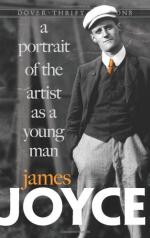A shaft of momentary anger flew through Stephen’s mind at these indelicate allusions in the hearing of a stranger. For him there was nothing amusing in a girl’s interest and regard. All day he had thought of nothing but their leave-taking on the steps of the tram at Harold’s Cross, the stream of moody emotions it had made to course through him and the poem he had written about it. All day he had imagined a new meeting with her for he knew that she was to come to the play. The old restless moodiness had again filled his breast as it had done on the night of the party, but had not found an outlet in verse. The growth and knowledge of two years of boyhood stood between then and now, forbidding such an outlet: and all day the stream of gloomy tenderness within him had started forth and returned upon itself in dark courses and eddies, wearying him in the end until the pleasantry of the prefect and the painted little boy had drawn from him a movement of impatience.
—So you may as well admit, Heron went on, that we’ve fairly found you out this time. You can’t play the saint on me any more, that’s one sure five.
A soft peal of mirthless laughter escaped from his lips and, bending down as before, he struck Stephen lightly across the calf of the leg with his cane, as if in jesting reproof.
Stephen’s moment of anger had already passed. He was neither flattered nor confused, but simply wished the banter to end. He scarcely resented what had seemed to him a silly indelicateness for he knew that the adventure in his mind stood in no danger from these words: and his face mirrored his rival’s false smile.
—Admit! repeated Heron, striking him again with his cane across the calf of the leg.
The stroke was playful but not so lightly given as the first one had been. Stephen felt the skin tingle and glow slightly and almost painlessly; and, bowing submissively, as if to meet his companion’s jesting mood, began to recite the confiteor. The episode ended well, for both Heron and Wallis laughed indulgently at the irreverence.
The confession came only from Stephen’s lips and, while they spoke the words, a sudden memory had carried him to another scene called up, as if by magic, at the moment when he had noted the faint cruel dimples at the corners of Heron’s smiling lips and had felt the familiar stroke of the cane against his calf and had heard the familiar word of admonition:
—Admit.
It was towards the close of his first term in the college when he was in number six. His sensitive nature was still smarting under the lashes of an undivined and squalid way of life. His soul was still disquieted and cast down by the dull phenomenon of Dublin. He had emerged from a two years’ spell of revery to find himself in the midst of a new scene, every event and figure of which affected him intimately, disheartened him or allured and, whether alluring or disheartening, filled him always with unrest and bitter thoughts. All the leisure which his school life left him was passed in the company of subversive writers whose jibes and violence of speech set up a ferment in his brain before they passed out of it into his crude writings.




